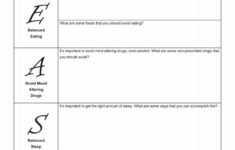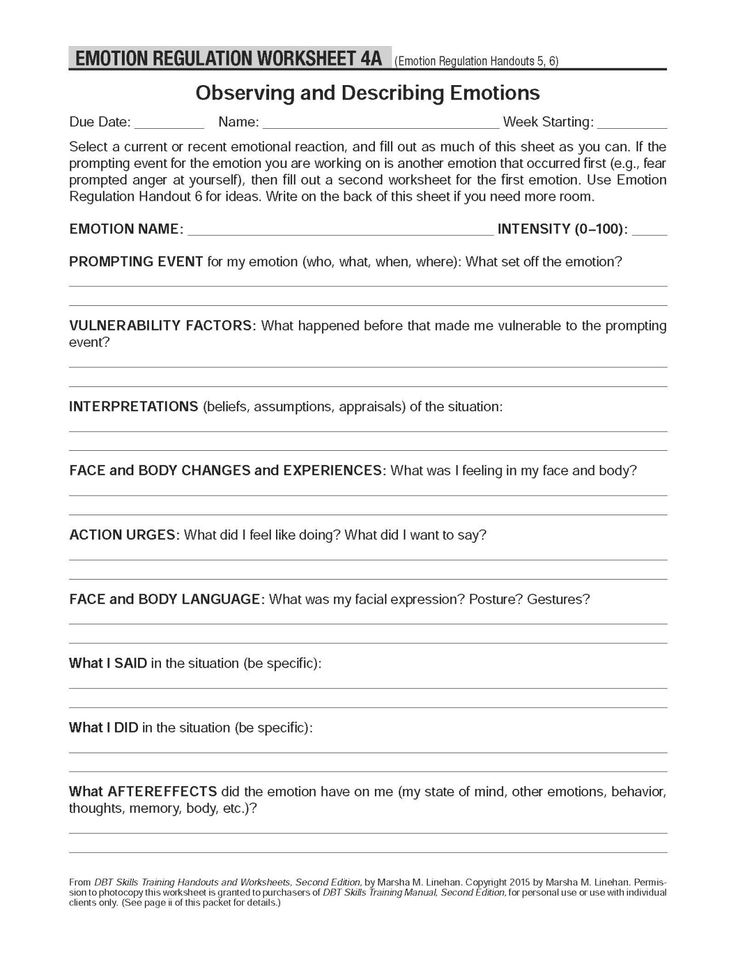5 Printable DBT Worksheets for Emotional Regulation

In the journey of mental health improvement, emotional regulation stands as a pivotal skill to master. Dialectical Behavior Therapy (DBT), developed by Dr. Marsha Linehan, offers a comprehensive framework for those who struggle with intense emotions. DBT focuses on four core modules: mindfulness, interpersonal effectiveness, distress tolerance, and emotion regulation. Here, we delve into five printable DBT worksheets specifically designed to help with emotional regulation through practical exercises and thought-provoking prompts.
1. Emotion Identification Worksheet


The first step in regulating emotions is recognizing what you’re feeling. This worksheet helps individuals:
- Identify current emotions through a list of descriptive words.
- Rate the intensity of each emotion on a scale.
- Identify the event or situation that might be triggering these emotions.
🧠 Note: Recognizing the complexity of emotions can lead to a deeper understanding and control over emotional responses.
2. Emotional Regulation Exercise: Opposite Action

The concept of opposite action in DBT suggests acting opposite to your current emotion to change your emotional state. This worksheet:
- Guides users through an emotional analysis.
- Helps choose an opposite action to the emotion they’re experiencing.
- Encourages follow-through on the chosen action.
3. The DEAR MAN Skills Worksheet


Emotional regulation also involves managing interpersonal situations effectively. The DEAR MAN acronym represents Describe, Express, Assert, Reinforce, Mindful, Appear confident, Negotiate. This worksheet:
- Walks users through structuring their communication during emotional conflicts.
- Helps prioritize and assert personal needs and wants.
- Encourages mindfulness in conversations to prevent emotional hijacking.
4. Building Mastery Worksheet

To regulate emotions, developing personal effectiveness in everyday tasks is beneficial. This worksheet focuses on:
- Setting small, achievable goals.
- Reflecting on the mastery gained through task completion.
- Boosting self-esteem and emotional resilience.
💪 Note: Mastery exercises not only help in emotional regulation but also contribute to overall life satisfaction.
5. TIPP Skills Worksheet

When emotions feel overwhelming, the TIPP skills (Temperature, Intense exercise, Paced breathing, Paired muscle relaxation) come into play. This worksheet:
- Outlines a protocol for quick emotional de-escalation.
- Guides users through step-by-step techniques to manage acute emotional distress.
- Helps individuals to regain control over their physiological responses.
Emotional regulation is a learned skill. Through consistent practice with these DBT worksheets, individuals can improve their ability to understand, accept, and manage their emotions. By applying mindfulness, acknowledging the emotion, choosing appropriate actions, and using interpersonal effectiveness techniques, one can navigate emotional challenges with greater resilience.
How often should I use DBT worksheets?

+
Use DBT worksheets daily, or as often as you feel the need for emotional regulation. Consistency is key to building new habits and coping skills.
Can DBT worksheets help with anxiety?

+
Yes, DBT techniques can be very effective for managing anxiety by providing tools for emotional regulation, mindfulness, and distress tolerance.
Do these worksheets require a therapist?

+
While these worksheets can be used independently, they are often more effective when paired with guidance from a DBT-trained therapist.